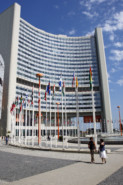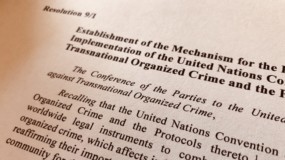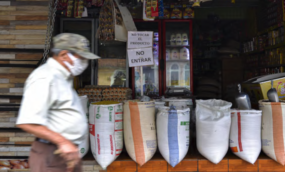Posted on 04 Nov 2024
Nearly a quarter of a century after the adoption of the United Nations Convention against Transnational Organized Crime (UNTOC) in 2000, the fruits of its labour are not readily apparent – transnational organized crime continues to expand and diversify, while global resilience to combat it has not kept pace. The convention’s limitations at a time of heightened geopolitical volatility were evident at the 12th Conference of the Parties (COP), held in Vienna from 14 to 18 October 2024. Despite an unprecedented level of civil society participation, their limited ability to contribute to substantive processes continues to hamper the convention’s potential impact.
Continued restrictions on civil society
Unlike other UN conferences, the UNTOC COP typically attracts little media attention or ministerial presence. However, the 12th session was notable for the participation of over 200 NGOs, including first-time attendance by indigenous leaders, who highlighted the environmental and social damage caused by organized crime in their communities. The increased attention from civil society is indicative of the growing recognition of such harms, and the urgency of the need to respond more effectively.
Despite the greater interest from civil society, restrictions on their substantive contribution to the UNTOC conference have increased in recent years, arguably reflecting how, more broadly, the space for civil society engagement has shrunk around the world. While NGOs can participate in the conference plenary and in the ‘Constructive Dialogue’ process outside of the official agenda, they remain excluded from the conference’s working groups and cannot directly contribute to the UNTOC’s country-level review process.
A 40-member state ‘Group of Friends’ has been supporting civil society involvement since 2022, when the participation of NGOs at the 11th UNTOC COP was under threat, ensuring no NGOs were blocked from attending COP 12. Regardless, the parties deferred a draft decision that would have clarified NGO observer status to the ‘intersessional period’ (between now and the next COP in 2026). Notably, references to civil society in the conference outcomes did not match the level of interest and expertise demonstrated by civil society at the COP, including through the publication of a civil society declaration on the UNTOC’s implementation. The UNTOC review mechanism is a case in point, as it not only functions with few resources and little speed, but also has strict restrictions on civil society access and participation. Without the active substantive contribution of civil society in forums such as the COP and its review mechanism, the effectiveness of the convention will be limited.
Political wrangling clouds environmental crime negotiations
The conference saw significant political contestation over environmental crime negotiations. France, Peru and Brazil tabled a resolution to enhance the ability of UNTOC parties to combat environmental crime internationally and advance discussions at the multilateral level on strengthening the relevant international legal framework, following similar resolutions introduced at the 10th and 11th conferences. Peru had previously advocated for a fourth protocol to the UNTOC on environmental crime, which has not yet been endorsed by France or its EU partners. However, Brazil is promoting several additional protocols to address specific environmental crimes. Given the lack of consensus on specific outcomes, the resolution sought to establish a new ‘expert group’ (a subsidiary body of the COP) to take these issues forward and propose solutions. However, during the negotiation process, many of the most useful or specific provisions were removed from the resolution in order to achieve consensus, and certain references to civil society’s role were omitted.
As with COP 11 in 2020, the negotiations became mired in geopolitical debate, not only on the topics at hand but also on broader political issues, with more authoritarian regimes showing little interest in addressing environmental crimes. At the same time, any resolution tabled by a Western country provides an opportunity for political point-scoring against the West. For example, the issue of sovereignty was injected into the discussions by Venezuela, which attempted to shoehorn text effectively attacking Israel and the West over Gaza into an otherwise legal and technical resolution. Iran did the same on sanctions, similarly proposing political text irrelevant to the resolution attacking the US and other Western countries. The most authoritarian countries (including Iran, Venezuela and Russia) married these tactics with efforts from various angles to limit the scope and inclusiveness of the proposed text, and succeeded in ensuring that the adopted resolution was stripped of much of its original substance.
While the adopted resolution retains references to indigenous and local communities, as well as victims and witnesses of environmental crimes, it lacks specific measures for preventing and combating these crimes, including through the use of civil society. The work of international and regional organizations (including the UNODC and INTERPOL) and the contributions of the private sector are also omitted. The result is a weaker and more confused response from the COP than the sponsors of the resolution had intended.
Easier ride for firearm resolution
Mexico’s proposed resolution on strengthening measures against firearm trafficking faced less opposition. Being tabled by a ‘non-Western’ country and taking a more technical approach, reflecting the discussions that had taken place in official COP working groups, helped it avoid the scrutiny faced by the environmental resolution. Mexico, which has traditionally promoted progressive language on gender and human rights, and supported civil society access in the Vienna policymaking bodies, succeeded in securing positive references to gender and human rights in the firearm resolution.
The resolution also clearly recognizes the role of civil society, in part by acknowledging the weakness of the current practice of excluding NGOs from attending COP working group meetings, and therefore encouraging countries to include NGO representatives in their delegations to the Firearms Protocol Working Group. The resolution also contains much-needed references to the violence and harm associated with the illicit firearm trade. Given the acrimony that has developed between the Mexican government and prominent US and European arms manufacturers as a result of a Mexican government lawsuit against them, this resolution could have had a more difficult path. But the targeted and technical nature of the resolution, coupled with the political focus of attention on the environmental crime resolution, ensured a smoother ride. For the resolution to be effective, it will be essential that delegations follow up on the invitation contained in the text and ensure the participation of civil society in their delegations to the working group meetings.
Is UNTOC working? The COP doesn’t know.
As the UNTOC approaches its 25th anniversary, questions remain about its effectiveness. While states made some progress at COP 12 in adopting resolutions on environmental crime and firearm trafficking, there was no tangible progress in assessing the impact of the convention. Its four-year-old review mechanism – the only official process available to examine the implementation of the convention, has produced only one completed review (Estonia) out of more than a hundred that should have been completed. With the review mechanism woefully behind schedule, the COP lacks the data needed to make any meaningful assessment of the convention’s progress.
The GI-TOC’s report ‘Is the UNTOC working?’ has sought to open a debate on whether the convention is fulfilling its potential as a global legal instrument to address organized crime. The report makes clear that while the convention is a much-needed legal instrument, it lacks real data and evaluation. The experience and evidence brought by civil society could fill this gap if they are permitted a greater role. Without increased assessment of and commitment to the core objectives of the treaty, any progress made on environmental crime or firearms trafficking through resolutions adopted in 2024 – or any future resolutions – will be hindered by the fundamental challenge of not having the evidence necessary to evaluate the UNTOC’s impact and improve its implementation through cooperation between governments and civil society.



